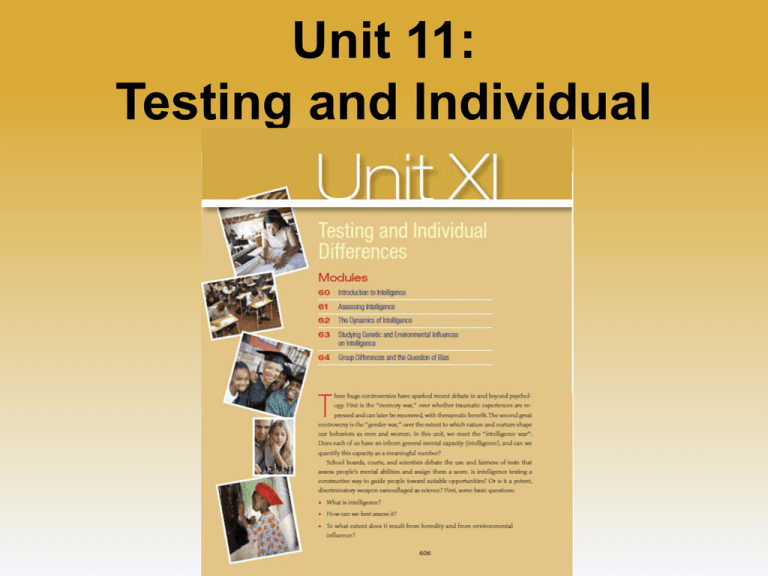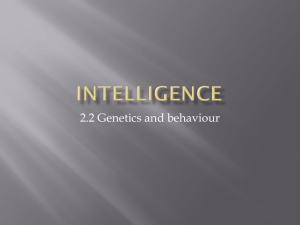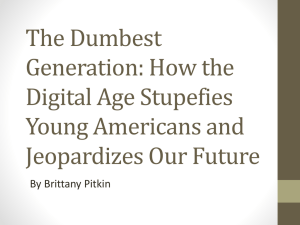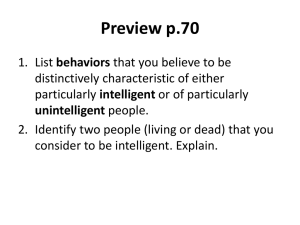Testing and Individual Difference
advertisement

Unit 11: Testing and Individual Differences Unit 11 - Overview • • • • Introduction to Intelligence Assessing Intelligence The Dynamics of Intelligence Studying Genetic and Environmental Influences on Intelligence • Group Differences and the Question of Bias Click on the any of the above hyperlinks to go to that section in the presentation. Module 60: Introduction to Intelligence Introduction • Intelligence • Intelligence test Is Intelligence One General Ability or Several Specific Abilities? Is Intelligence One General Ability or Several Specific Abilities? • Spearman’s General intelligence (g) –Factor analysis –Comparison to athleticism • Thurstone’s counter argument g Is Intelligence One General Ability or Several Specific Abilities? Theories of Multiples Intelligences: Garner’s Eight Intelligences • Savant syndrome • Gardner’s Eight Intelligences – – – – – – – – Linguistic Logical-mathematical Musical Spatial Bodily-kinesthetic Intrapersonal Interpersonal Naturalist Is Intelligence One General Ability or Several Specific Abilities? Theories of Multiples Intelligences: Garner’s Eight Intelligences • Grit Is Intelligence One General Ability or Several Specific Abilities? Theories of Multiples Intelligences: Sternberg’s Three Intelligences • Sternberg’s Three Intelligences –Analytical (academic problemsolving intelligence –Creating intelligence –Practical intelligence Emotional Intelligence Emotional Intelligence • Emotional intelligence –Perceive emotions –Understand emotions –Manage emotions –Use emotions for adaptive or creative thinking Is Intelligence Neurologically Measurable? Is Intelligence Neurologically Measurable? Brain Size and Complexity • Brain size studies • Brain complexity studies –Neural plasticity –Gray matter versus white matter Is Intelligence Neurologically Measurable? Brain Function • Perceptual speed • Neurological speed Module 61: Assessing Intelligence Origins of Intelligence Testing Origins of Intelligence Testing • Francis Galton’s intelligence testing –Reaction time –Sensory acuity –Muscular power –Body proportions • Hereditary Genius Origins of Intelligence Testing Alfred Binet: Predicting School Achievement • Alfred Binet –Identifying French school children in need of assistance –Mental age –Chronological age Origins of Intelligence Testing Lewis Terman: The Innate IQ • Stanford-Binet Test –Lewis Terman –New age norms –Adding superior end Origins of Intelligence Testing Lewis Terman: The Innate IQ • Intelligence quotient (IQ) • IQ = (mental age/chronological age) X 100 • IQ of 100 is considered average • World War I testing Modern Tests of Mental Abilities Modern Tests of Mental Abilities • Achievement tests • Aptitude tests Modern Tests of Mental Abilities • Wechsler Adult Intelligence Scale (WAIS) –Wechsler Intelligence Scale for Children (WISC) Principles of Test Construction Principles of Test Construction Standardization • Standardization –Normal curve (bell curve) Principles of Test Construction Standardization • Normal curve (bell curve) Principles of Test Construction Standardization • Flynn effect Principles of Test Construction Reliability • Reliability –Scores correlate –Test-retest reliability –Split-half reliability Principles of Test Construction Validity • Validity –Content validity • Criterion –Predictive validity Module 62: The Dynamics of Intelligence Stability or Change? Stability or Change? Aging and Intelligence • Cross-Sectional Evidence • Longitudinal Evidence – Cohort Stability or Change? Aging and Intelligence • It all depends –Crystallized intelligence –Fluid intelligence Stability or Change? Stability Over the Life Span Extremes of Intelligence Extremes of Intelligence The Low Extreme • Intellectual disability –Mental retardation –Down syndrome • 21st chromosome –Mainstreamed Extremes of Intelligence The High Extreme • Terman’s study of gifted • Self-fulfilling prophecy • Appropriate developmental placement Module 63: Studying Genetic and Environmental Influences on Intelligence Twin and Adoption Studies Twin and Adoption Studies • Identical twin studies –Polygenetic –Heritability • Adoptive children studies Heritability Environmental Influences Environmental Influences • Early environmental influences –Tutored human enrichment –Targeted training • Schooling and intelligence –Project Head Start Module 64: Group Differences on the Question of Bias Group Differences in Intelligence Test Scores Group Differences in Intelligence Test Scores • • • • • • Gender Similarities and Differences Spelling Verbal ability Nonverbal ability Sensation Emotion-detecting ability Math and spatial aptitudes Group Differences in Intelligence Test Scores Racial and Ethnic Similarities and Differences • Ethnic similarities • Ethnic differences The Question of Bias The Question of Bias • Two meanings of bias –Popular sense –Scientific sense • Test-taker’s expectations –Stereotype threat









